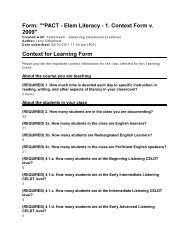The Tutoring Book - California State University, Sacramento
The Tutoring Book - California State University, Sacramento
The Tutoring Book - California State University, Sacramento
You also want an ePaper? Increase the reach of your titles
YUMPU automatically turns print PDFs into web optimized ePapers that Google loves.
Teaching the Writing Tutor to Praise<br />
46<br />
Denise Pica<br />
Spring 2008<br />
To say, ''well done'' to any bit of good work is to take hold of the powers which have made the effort and<br />
strengthen them beyond our knowledge.<br />
Phillip Brooks (1835-1893)<br />
Paul Diederich, a senior research associate for the Educational Testing Service, once stated that<br />
“noticing and praising whatever a student does well improves writing more than any kind or amount of<br />
correction of what he does badly, and that it is especially important for the less able writers” to hear praise<br />
because they “need all the encouragement they can get” (Daiker155). Indeed, the view that praise aids<br />
students in developing the type of confidence required in college-level writing has long been touted by<br />
members of the academic community. However, while many tutors may know intuitively that students<br />
become better writers when they are given the proper encouragement and feedback, many are hesitant to<br />
really use the art of praise to its fullest advantage. <strong>The</strong>refore, in the effort to make praise more available<br />
to tutors as a means of connecting with and responding to tutees, this essay offers various perspectives<br />
and suggestions that will not only aid you in developing and increasing your personal arsenal of<br />
praiseworthy habits, but also in acknowledging the true power of praise and the various forms it takes in<br />
the tutor-writer relationship.<br />
Step One: Recognizing Why We Praise<br />
In “Learning to Praise,” author Donald Daiker notes that “praise may be especially important for<br />
students who have known little encouragement and, in part for that reason, suffer from writing<br />
apprehension” (155). For many tutors, myself included, praise just seems to come more naturally when<br />
working with students who have difficulties with their writing. Perhaps, in some ways, we see any little<br />
amount of improvement as a reason for celebration and our comments to students not only seem to be an<br />
attempt to point out moments of progress, but also an excuse for offering encouragement to continue<br />
writing. We give more praise to these weaker writers because we know their history—poor grades on<br />
papers, endless pages of negative teacher feedback, and a deflated ego to match their status as “failures.”<br />
Our praise for these students therefore stems not merely from our need to recognize and honor their<br />
evolution as writers, but also from a need to reestablish their long-lost confidence as authors. We<br />
praise—sometimes more than necessary—because we want these students to feel like they have<br />
accomplished something and made inroads as writers. We praise because we want to erase some of the<br />
frustration, anger, hurt, and disillusionment that has collected over the years because of their continual<br />
inability to master the conventions of form and language required of “good” writers. In addition, we<br />
seem to praise students more often when we fear that they may have already given up on writing. As<br />
Daiker notes, students who are highly apprehensive about writing because of their weaker skills<br />
“anticipate negative consequence” and therefore “avoid writing” (155). In turn, “the avoidance of<br />
writing—the lack of practice—leads to further negative consequences: writing of poor quality that<br />
receives low grades and unfavorable comments” (Daiker155). Maybe, by praising the students we feel<br />
are apprehensive about even approaching a writing task, we hope to rejuvenate or re-motivate them—to<br />
instill within them some of the zest for writing that we have found over the years. However, while this<br />
increased amount of support may be valuable to weaker writers because it provides them with much<br />
needed positive reinforcement, it often seems that we neglect to give “stronger” writers equal treatment.<br />
Consequentially, we must ask ourselves why this inconsistency exists and whether our uneven praise has<br />
negative effects on these individuals.

















